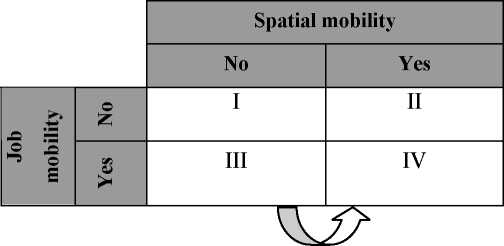Evidence shows that wages are positively correlated to tenure (due to increasing
experience, firm-specific human capital, or efficiency wages), potential experience, and
schooling. On the other side, spatial mobility is negatively correlated to age, and
distance, and positively correlated to schooling.
3. JOB MOBILITY, SPATIAL MOBILITY AND WAGE MOBILITY
In this section we analyse job, spatial and wage mobility in the Portuguese economy.
We are concerned with the joint effects of a worker experiencing several types of
mobility. Figure 1 summarizes the possible situations.
Figure 1
Types of mobility

In cell I we have the situation of a stayer that maintains hers professional status quo. In
cell II we have situations of workers that stay in the same employer but change
workplace, either because they were relocated among firm different locations or because
the firm relocate its activity. More relevant situations for this paper are cells 3 and,
mainly, 4 where there is job mobility and in some cases conjugated with spatial
mobility.
The hypothesis that we intend to test is whether workers that experience both job and
spatial mobility earns higher wage.
3.1.Data
To address the question we use data from a Longitudinal Matched Employer-Employee
Micro-data Set (LMEEM) that was constructed to analyse job and worker flows in the
More intriguing information
1. The Macroeconomic Determinants of Volatility in Precious Metals Markets2. Environmental Regulation, Market Power and Price Discrimination in the Agricultural Chemical Industry
3. Deletion of a mycobacterial gene encoding a reductase leads to an altered cell wall containing β-oxo-mycolic acid analogues, and the accumulation of long-chain ketones related to mycolic acids
4. The name is absent
5. Stakeholder Activism, Managerial Entrenchment, and the Congruence of Interests between Shareholders and Stakeholders
6. The name is absent
7. The name is absent
8. Auctions in an outcome-based payment scheme to reward ecological services in agriculture – Conception, implementation and results
9. On Evolution of God-Seeking Mind
10. The name is absent